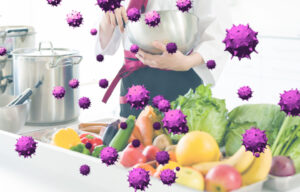The Bugs in Your Tummy Can Help
Hello Everyone! If you have ever had food poisoning, you will know that it is a very unpleasant experience that you want to avoid happening again, but have you ever wondered if it was food poisoning?
If several people ate the same food as you, how come they didn’t have the same reaction?
There are many reasons why humans differ in their response to exposure to bacterial infections. For this post, I will tell you why good gut health armors against food poisoning and the subsequent risk of developing inflammatory conditions like IBS and IBD.
Food Poisoning Statistics
6 Ways to Avoid Food Poisoning:
Does Gut Health Reduce Food Poisoning Risk?
How Does Gut Health Stop Bacteria?
How Does The Body Deal With Poisons?
Our Adaptive Immunity
What Raises the Risk of Food Poisoning?
What Can Food Poisoning Cause?
Food Poisoning and Further Disease Studies

Food Poisoning Statistics
Approximately 600 million people fall ill to food poisoning a year, according to the World Health Organisation (WHO). Most of the cases reported are caused by Salmonella and Campylobacter, which have high levels of antimicrobial resistance.
(It isn’t just food where Salmonella and Campylobacter can be harbored, as pets can spread the bacteria, and they may not show any symptoms).
Bacteria breed faster in warmer temperatures, and there is a greater contamination risk when you prepare and eat food outside.

6 Ways to Avoid Food Poisoning:
- – Separate raw meat, eggs, and fish from other foods
- – Wash your hands and cooking preparation area, using different chopping boards and different knives
- – Avoid touching your mouth and face while prepping
- – Cook food to a safe temperature (e.g., steak, lamb chops, and fish need to be 145 degrees)
- – Don’t leave food and leftovers out of the refrigerator for more than an hour (maximum of two for leftovers). Keep food in a cooler until you cook it.
- – Improve gut health.

Does Gut Health Reduce Food Poisoning Risk?
Absolutely! Ensuring that your gut health is tip-top means that if you eat contaminated food, your gut and immune system are fully equipped to fight Salmonella and Campylobacter’s maneuvers!
It will also reduce the risk of developing leaky gut syndrome, IBS, IBD, diabetes, and other chronic inflammatory conditions.
Indeed, good gut health reduces inflammation and aids in putting autoimmune conditions into remission.
Suppose you have a compromised immune system or inflammation running in your body. In that case, it will leave you susceptible to bacteria and viruses, and it will be challenging for your body to fight them.

How Does Gut Health Stop Bacteria?
The bugs in our tummies provide immune homeostasis.
As I mentioned, poor gut health (dysbiosis) is linked to a weakened immune system, making it less able to fight bacteria.
Compromised gut health is also linked to non-communicable diseases. 70% of gut-associated lymphoid tissue (GALT) resides in the gut.
GALT and the intestine are essential for the body’s immune defense. They allow tolerance to good bacteria and nutrients from our diets while dispelling invaders!
A healthy gut contains an arsenal of barriers to incoming pathogenic organisms that come in physical, immune, chemical, and enzymatic forms!

Because Salmonella and Campylobacter have high-level antimicrobial resistance (which is why they can transfer from animals to humans in the food chain), they are an extra challenge to the immune system (particularly where the immune system is compromised!).
How Does the Body Deal With Poisons?
What happens usually is that when pathogens enter the body, an inflammatory response is triggered. A lot goes on to successfully engulf and destroy invading micro-organisms in a healthy body.
The innate immune system prevents invaders from entering via:
- *skin – keeping them out!
- *mucus – trapping them!
- *immune system cells – attacking them on entry!
- *sweat and tear enzymes – which are anti-bacterial compounds!
- *stomach acid – destroying them.

Our Adaptive Immunity
Our adaptive immunity is where our immune system recognizes what a pathogen is, and when it enters the body, our cells and organs create antibodies. A process of attack and destruction occurs, and then the immune system puts that bacteria that has infected you into a memory box so that you can get long-term protection from that pathogen.
During the invasion, amongst many other things, the immune system induces reactive oxygen species (ROS) production, too. This is where Salmonella and Campylobacter gain strength because they thrive on the proteins from this reaction.
Many gut bugs in your tummy at this time cannot survive the changed environment, which gives these bacteria an advantage as they take over!

However, certain bacteria produced in healthy, diverse microbiota before the invasion stop Salmonella from raising their internal pH to facilitate cellular functions required for their growth.
Increasing the diversity of gut bugs enhances resistance to pathogen colonization.
It’s all a complex interplay of different strains and species in the gut, where one microbe affects other microbes’ functions.
Quite like the Eat Burn Sleep lifestyle! One factor affects the other/s in a symbiotic way!
An interplay of nutrition (from recipes like these: Italian Chicken Salad & Paleo Energy Bars), lifestyle, sleep, movement, and neuroplasticity is needed for good gut and immune health.
This is why you can’t just do one thing like take some probiotics and expect them to do the trick of good gut and overall health.
Nutrition absorption and distribution is a significant fact influencing a robust bacterial community.

In case you missed these posts: What Kills Candida Fast, Naturally?, How to Recover From Virus Infections, How to Boost Your Immunity to Fight Viruses.
What Raises the Risk of Food Poisoning?
Many people are more vulnerable to bacteria, which is one explanation why you could eat the same contaminated food as someone else, and only one of you has a reaction.
Vulnerable people include children who are under five and people who are over 65, pregnant, and who have existing conditions. Members, for advice on what to avoid for your condition, follow the personalized advice for your condition.
Here is a list of ways our immune is weakened:
- *Poor nutrition
- *Autoimmune diseases
- *Chronic inflammation conditions
- *Cancer
- *HIV/Aids
- *Liver disease
- *Kidney disease
- *Unhealthy lifestyle: smoking, alcohol, lack of exercise, high fat/ high sugar diets, low-calorie diets
- *Lack of sleep
- *Obesity
- *Immune-suppressing medication
- *Medication/antibiotics
- *Chronic stress
- *Deficiencies
- *Age
- *Isolation
Members get in-depth Insomnia advice here.

What Can Food Poisoning Cause?
Food poisoning usually clears up within 3-6 days, but there is strong evidence of how food poisoning can lead to further disease.
Leaky gut syndrome, gut bacteria imbalance, immune dysregulation, and inflammation are induced by the proteins in food-poisoning bacteria like Salmonella.
Due to the changes in the gut lining and gut bacteria imbalance, symptoms can continue once the infection has passed.
Gut dysbiosis equals immune dysregulation and chronic inflammation, and the risk of autoimmune diseases and immune dysregulation causes gut dysbiosis!
This leads to immune dysregulation and other chronic inflammatory conditions.

Food Poisoning and Further Disease Studies
So, in answer to whether food poisoning can cause chronic inflammation, the answer is yes.
A significant volume of research shows the link between disease development after food poisoning and IBS, reactive arthritis, IBD, Crohn’s Disease, Ulcerative Colitis, and other chronic inflammatory conditions.
These are just a few food poisoning and further disease studies:
Chronic inflammation can cause DNA damage, epigenetic modulation, and chromosome instability, leading to colon cancer risks. Mughini-Gras et al. (2018).
One in every nine people exposed to foodborne illness develops IBS at a rate four times higher than the non-exposed individuals, according to a meta-analysis of 45 studies. Klem et al. (2017).
IBD is linked to food poisoning, according to numerous studies. For instance, a study in Denmark noted that an episode of gastroenteritis with Salmonella and Campylobacter species tested positive is significantly associated with an increased risk of new-onset Ulcerative Colitis and Crohn’s Disease.

Do enjoy traveling, eating outside, and socializing, though. It’s all good for your mental and physical health, and your immunity needs you to be social (unless your doctor has told you otherwise).
Just remember, use your nose when it comes to food and drink. Don’t take the chance if they don’t pass the sniff test; if you think food is undercooked when you dine anywhere, don’t eat it. Don’t compromise your health.
It’s never too late to focus on gut health. It’s imperative to combat many health issues.
Have a beautiful day!


